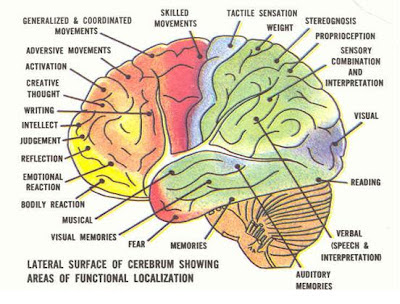The Brain Does That? So What?
In a column earlier this year, Psychology Today contributor Nate Kornell wrote about his annoyance with the excitement over findings that "the brain does that." Kornell's response to findings that "the brain does that" is a bit of an intellectual "duh!" Or, closer to his own words, the response is more of an exasperated "Of course it does!"
And I have to admit I share his annoyance ... to a certain degree.
So what if researchers "discover" there are underlying neural mechanisms of the placebo effect? Does this make the placebo effect any more "real"? (Or, for that matter, any less real?) And, if we discover that reading causes activation in the brain, does that give us a meaningful reason to engage in more reading (as was argued in a recent guardian article)? (See the Onion's take here and here.)
As Kornell puts it, "every mental process is represented in the brain." Thus, according to Kornell if there is any change in our mental life, the change will be reflected somewhere in the brain. So, there is no big surprise, no profound discovery when researchers find that something "happens in the brain" whenever there is a change in our mental life. If people discover that the brain does that (whatever that may be), according to Kornell, there is no reason to be excited, and if we find ourselves becoming excited, we should simply "calm down."
But of course, neuroscience isn't just showing us that changes in mental life are associated with changes in the brain. Neuroscience is uncovering the biological mechanisms associated with the changes in our mental life. Understanding the mechanisms associated with changes in our mental life can have profound impacts. The sorts of treatments, interventions, and enhancements that can be devised through a more thorough understanding of the biological mechanisms of our mental lives have the prospects (at least in many cases) of far exceeding the efficacy of the sorts of treatments, interventions, and enhancements that could be devised with only an understanding of psychology.
So, when a researcher proclaims, "The brain does that!" an appropriate first response may be "of course it does!" But immediately following this trite reactive dismissal of the neuroscience, the second response should be a genuinely reflective, "So what?" I think if we all took a moment to seriously consider the answers to the 'so what' question, we would often find genuine reasons to be excited ... and given the potential ethical implications that often come along with more effective treatments, interventions, and enhancements, perhaps even a little bit concerned.
Want to cite this post?
Shepard, J. (2012). The Brain Does That? So What?. The Neuroethics Blog. Retrieved on
, from http://www.theneuroethicsblog.com/2012/06/brain-does-that-so-what.html
And I have to admit I share his annoyance ... to a certain degree.
So what if researchers "discover" there are underlying neural mechanisms of the placebo effect? Does this make the placebo effect any more "real"? (Or, for that matter, any less real?) And, if we discover that reading causes activation in the brain, does that give us a meaningful reason to engage in more reading (as was argued in a recent guardian article)? (See the Onion's take here and here.)
As Kornell puts it, "every mental process is represented in the brain." Thus, according to Kornell if there is any change in our mental life, the change will be reflected somewhere in the brain. So, there is no big surprise, no profound discovery when researchers find that something "happens in the brain" whenever there is a change in our mental life. If people discover that the brain does that (whatever that may be), according to Kornell, there is no reason to be excited, and if we find ourselves becoming excited, we should simply "calm down."
But of course, neuroscience isn't just showing us that changes in mental life are associated with changes in the brain. Neuroscience is uncovering the biological mechanisms associated with the changes in our mental life. Understanding the mechanisms associated with changes in our mental life can have profound impacts. The sorts of treatments, interventions, and enhancements that can be devised through a more thorough understanding of the biological mechanisms of our mental lives have the prospects (at least in many cases) of far exceeding the efficacy of the sorts of treatments, interventions, and enhancements that could be devised with only an understanding of psychology.
So, when a researcher proclaims, "The brain does that!" an appropriate first response may be "of course it does!" But immediately following this trite reactive dismissal of the neuroscience, the second response should be a genuinely reflective, "So what?" I think if we all took a moment to seriously consider the answers to the 'so what' question, we would often find genuine reasons to be excited ... and given the potential ethical implications that often come along with more effective treatments, interventions, and enhancements, perhaps even a little bit concerned.
Want to cite this post?
Shepard, J. (2012). The Brain Does That? So What?. The Neuroethics Blog. Retrieved on
, from http://www.theneuroethicsblog.com/2012/06/brain-does-that-so-what.html




Comments
Post a Comment